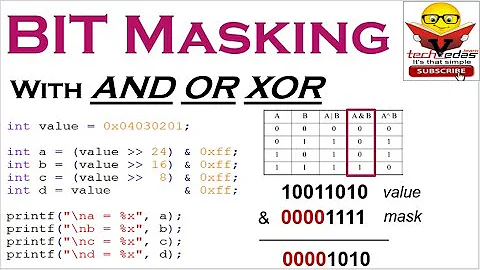Binary mask in Tensorflow
Solution 1
You can easily programmatically create such a tensor mask using python. Then convert it to a tensor. There's no such support in the TensorFlow API. tf.tile([1,0], num_of_repeats) might be a fast way to create such mask but not that great either if you have odd number of columns.
(Btw, if you end up creating a boolean mask, use tf.boolean_mask())
Solution 2
Currently, Tensorflow does not support numpy-like assignment.
Here is a couple of workarounds:
tf.Variable
tf.Tensor cannot be changed, but tf.Variable can.
a = tf.constant([[1,2,3,4,5],[6,7,8,9,10]])
mask = tf.Variable(tf.ones_like(a, dtype=tf.int32))
mask = mask[0,1::2]
mask = tf.assign(mask, tf.zeros_like(mask))
# mask = [[1,0,1,0,1],[1,1,1,1,1]]
tf.InteractiveSession()
tf.global_variables_initializer().run()
print(mask.eval())
tf.sparse_to_dense()
indices = tf.range(1, 5, 2)
indices = tf.stack([tf.zeros_like(indices), indices], axis=1)
# indices = [[0,1],[0,3]]
mask = tf.sparse_to_dense(indices, a.shape, sparse_values=0, default_value=1)
# mask = [[1,0,1,0,1],[1,1,1,1,1]]
tf.InteractiveSession()
print(mask.eval())
Solution 3
There's a more efficient solution, but this will certainly get the job done
myshape = myTensor.shape
# create tensors of your tensor's indices:
row_idx, col_idx = tf.meshgrid(tf.range(myshape[0]), tf.range(myshape[1]), indexing='ij')
# create boolean mask of odd numbered columns on a particular row.
mask = tf.where((row_idx == N) * (col_idx % 2 == 0), False, True)
masked = tf.boolean_mask(myTensor, mask)
in general you can adapt this method for any such index-based masks, and to rank-n tensors
Related videos on Youtube
Markus Woodson
Updated on June 04, 2022Comments
-
Markus Woodson about 2 years
I would like to mask every other value along a particular dimension of a Tensor but don't see a good way to generate such a mask. For example
#Masking on the 2nd dimension a = [[1,2,3,4,5],[6,7,8,9,0] mask = [[1,0,1,0,1],[1,1,1,1,1]] b = a * mask #would return [[1,0,3,0,5],[6,0,8,0,0]]Is there an easy way to generate such a mask?
Ideally I would like to do something like the following:
mask = tf.ones_like(input_tensor) mask[:,::2] = 0 mask * input_tensorBut slice assigning doesn't seem to be as simple as in Numpy.







![[AI] Binary classification using tensorflow keras](https://i.ytimg.com/vi/PM6uvCLyeXM/hqdefault.jpg?sqp=-oaymwEcCOADEI4CSFXyq4qpAw4IARUAAIhCGAFwAcABBg==&rs=AOn4CLDKoPqOD8aPWFaKKsvL1tluauN7JQ)

